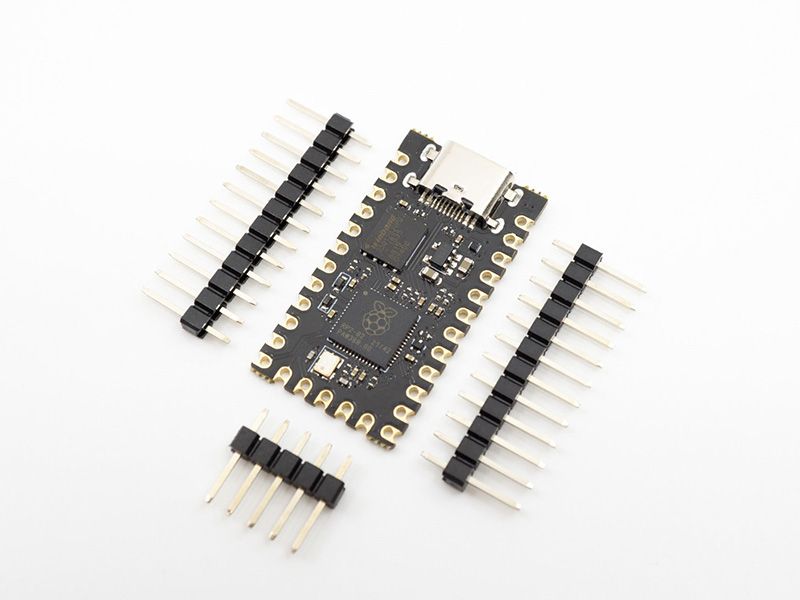
Liatris by SplitKB
The Liatris is a new controller designed by splitkb.com that’s a designed specifically for (split) keyboards. It’s a drop-in replacement for the Pro Micro, and a perfect alternative for other RP2040-based controllers.
Core features
- Designed for maximum compatibility with kits that work with Pro Micro controllers, including the Kyria and our Aurora Series.
- Supports QMK (all capabilities) and ZMK firmware (wired, single controller) out of the box. Also compatible with KMK and CircuitPython.
- Has 128Mbit (16MB) of flash memory, ensuring you’ll never run out of space even when making heavy use of OLED animations or text expansion macros. We added as much flash as the RP2040 can handle!
- Access to 23 GPIO pins to use on your keyboard, meaning that on any Aurora Series keyboard, you’ll have 5 pins left over for any modifications you may want to do.
- Rear-facing bootloader button allowing you to easily recover from a bricked firmware, even when mounted in the usual upside-down position.
- An ultra-low profile with a mid-mounted USB-C port and a mere 1mm thick PCB. The rear-mounted reset button checks in at only 0.35mm, too, like it’s almost not there.
- Supports at least 1A of power output, so you can maximize the output of your LEDs when your computer outputs enough power.
Advanced features
The default settings are right for most people out of the gate. For those who demand more of their controller, we have some advanced features:
- 5V tolerant I2C pins so you won’t have to worry when hooking up an I2C device like an OLED or trackball board;
- Runs at 3.6V for better 5V signal compatibility so your LEDs will listen better to those smooth colour change commands (according to data sheets, 3.5V is the minimum to reliably talk with LEDs);
- Selectable voltage on the VCC (defaults to 5V to support RGB LEDs) and RAW pins (which we named VA, and isn’t connected by default to be compatible with common Corne-style kits that bridge VCC with RAW on the keyboard by default) for when you need to get specific with your kit;
- USB data pads for hand wired builds where you want to have a separate USB port somewhere else on the board;
- Debug pads to be able to better look into microcontroller behaviour when you really need to.
Purchase
Contribute
Have some info to add for this board? Edit the source for this page here.
CircuitPython 9.2.8
This is the latest stable release of CircuitPython that will work with the Liatris. Use this release if you are new to CircuitPython.
Modules included in this download
_asyncio _bleio _pixelmap adafruit_bus_device adafruit_pixelbuf aesio alarm analogbufio analogio array atexit audiobusio audiocore audiomixer audiomp3 audiopwmio binascii bitbangio bitmapfilter bitmaptools bitops board builtins builtins.pow3 busdisplay busio busio.SPI busio.UART codeop collections countio digitalio displayio epaperdisplay errno floppyio fontio fourwire framebufferio getpass gifio hashlib i2cdisplaybus i2ctarget imagecapture io jpegio json keypad keypad.KeyMatrix keypad.Keys keypad.ShiftRegisterKeys keypad_demux keypad_demux.DemuxKeyMatrix locale math memorymap microcontroller msgpack neopixel_write nvm onewireio os os.getenv paralleldisplaybus pulseio pwmio qrio rainbowio random re rgbmatrix rotaryio rp2pio rtc sdcardio select sharpdisplay storage struct supervisor synthio sys terminalio tilepalettemapper time touchio traceback ulab usb usb_cdc usb_hid usb_host usb_midi usb_video vectorio warnings watchdog zlibFeatures: STEMMA QT/QWIIC, USB-C, Breadboard-Friendly, Castellated Pads
CircuitPython 10.0.0-alpha.7
This is the latest development release of CircuitPython that will work with the Liatris.
Alpha development releases are early releases. They are unfinished, are likely to have bugs, and the features they provide may change. Beta releases may have some bugs and unfinished features, but should be suitable for many uses. A Release Candidate (rc) release is considered done and will become the next stable release, assuming no further issues are found.
Please try alpha, beta, and rc releases if you are able. Your testing is invaluable: it helps us uncover and find issues quickly.
Release Notes for 10.0.0-alpha.7
Modules included in this download
_asyncio _bleio _bleio (HCI co-processor) _pixelmap adafruit_bus_device adafruit_pixelbuf aesio alarm analogbufio analogio array atexit audiobusio audiocore audiomixer audiomp3 audiopwmio binascii bitbangio bitmapfilter bitmaptools bitops board builtins builtins.pow3 busdisplay busio busio.SPI busio.UART codeop collections countio digitalio displayio epaperdisplay errno floppyio fontio fourwire framebufferio getpass gifio hashlib i2cdisplaybus i2ctarget imagecapture io jpegio json keypad keypad.KeyMatrix keypad.Keys keypad.ShiftRegisterKeys keypad_demux keypad_demux.DemuxKeyMatrix locale lvfontio math memorymap microcontroller msgpack neopixel_write nvm onewireio os os.getenv paralleldisplaybus pulseio pwmio qrio rainbowio random re rgbmatrix rotaryio rp2pio rtc sdcardio select sharpdisplay storage struct supervisor synthio sys terminalio tilepalettemapper time touchio traceback ulab usb usb_cdc usb_hid usb_host usb_midi usb_video vectorio warnings watchdog zlibFeatures: STEMMA QT/QWIIC, USB-C, Breadboard-Friendly, Castellated Pads
Absolute Newest
Every time we commit new code to CircuitPython we automatically build binaries for each board and language. The binaries are stored on Amazon S3, organized by board, and then by language. These releases are even newer than the development release listed above. Try them if you want the absolute latest and are feeling daring or want to see if a problem has been fixed.
Previous Versions of CircuitPython
All previous releases of CircuitPython are available for download from Amazon S3 through the button below. For very old releases, look in the OLD/ folder for each board. Release notes for each release are available at GitHub button below.
Older releases are useful for testing if you something appears to be broken in a newer release but used to work, or if you have older code that depends on features only available in an older release. Otherwise we recommend using the latest stable release.
